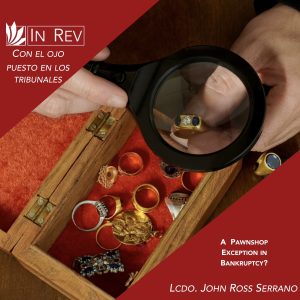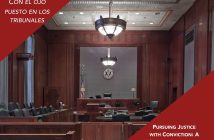
Commentary
By: John Ross Serrano*
Introduction
Cases from the United States Bankruptcy Court for the District of Puerto Rico have established that property pledged in a pawn loan agreement may exit the bankruptcy estate if not timely redeemed by a debtor under the Bankruptcy Code or Puerto Rico law. This article will evaluate the pawnshop exception and its interpretation by other federal courts to offer a broader understanding of what an insolvent debtor, who is a party to a pawn loan agreement, must consider when filing for bankruptcy.
The pawnshop exception, also referred to as the pawn shop exclusion, is a concept brought up by pawnbrokers in bankruptcy proceedings to ask the court to declare that a pawned item in their possession is not property of the estate. The pawnshop exception is not found ad verbatim in the Bankruptcy Code. This exception stems from section 541 of the Bankruptcy Code, which defines what is and what is not property of the estate.[1]Property of the estate does not include “pledged or sold tangible personal property . . . as collateral for a loan or advance of money” given by a licensed person to conduct such a business, when: (1) such property “is in the possession of the pledgee or transferee;” (2) “the debtor has no obligation to repay the loan, redeem the collateral, or buy back the property at a stipulated price;” and (3) when the debtor or the trustee have not exercised a redemption right under section 108(b) of the Bankruptcy Code or state law.[2] Property that is not part of the bankruptcy estate does not enjoy the protections of the automatic stay, which prohibits collection actions against the debtor and attempts to obtain possession or exercise control over property of the estate, among others.[3]
I. Pawn Loans in Bankruptcy
In Puerto Rico, pawnbroker transactions are regulated under the Pawnbroking Business and Operations Regulatory Act (hereinafter “Pawnbroking Act”).[4] This law defines a pawn loan as “[t]he delivery of a sum of money by a pawnbroker in exchange for any personal property, including motor vehicle titles, susceptible of ownership, as collateral for compliance with the obligation to repay said sum on a specific fixed or future date, together with the accrued interest thereon and any other additional charge allowed by this chapter.”[5] The statute also considers a pawn loan to be “…the sale of personal property with a repurchase agreement, when the purchaser acquires such good, granting the vendor the right to redeem the same, paying a previously determined amount in excess of the original sales price, plus the charges allowed.”[6] This transaction is also deemed to have occurred when a debtor pledges “personal property and title thereof” but keeps the physical personal property in his possession.[7] The loan’s maturity date is thirty days and may be extended by written agreement of the parties to a term that does not exceed fifteen months.[8] When the maturity date is reached, a redemption right arises in favor of the debtor, and the pawnbroker must hold the pledged property for at least thirty days from the maturity date of the loan.[9] Failing to exercise the redemption right results in the forfeiture of the pledged goods to the pawnbroker “and absolute title to the pledged goods shall be conveyed to the [pawnbroker]by operation of law, and no further notice to the [debtor]shall be necessary.”[10]
A. United States Bankruptcy Court for the District of Puerto Rico
The United States Bankruptcy Court for the District of Puerto Rico has dealt with Puerto Rico’s Pawnbroking Act. In the case of In re Pagan Del Toro, a pawnbroker objected to the confirmation of the chapter 13 debtor’s plan and raised the pawnshop exception.[11] The pawnshop had the ownership title of the debtor’s vehicle as a pledge and contended that the debtor cannot modify the redemption period through a chapter 13 plan.[12]The bankruptcy court granted the pawnbroker’s objection to the confirmation of the plan because the debtor did not exercise his redemption right under the Pawnbroking Act or the Bankruptcy Code, thereby rendering him unable to propose payments towards the pawn loan under the plan.[13]The court further found that under Puerto Rico law: (a) possession of the vehicle’s title conforms with the section 541(b)(8)(A) requirement of having possession of the pledged item; and (b) that under state law the pledge is conveyed automatically to the pledgee when the debtor failed to exercise the redemption right.[14] In the case of In re Rivera Santana, a pawnbroker also raised the pawnshop exception in a motion seeking relief from the automatic stay.[15] The pledge in this case was also a vehicle’s ownership title.[16] The bankruptcy court lifted the stay because it found that the debtor had failed to exercise the redemption right; that possession of the vehicle’s title meant possession of the pledge; and that the chapter 13 plan could not modify the rights of the pawnbroker by paying the debt through the plan.[17]
These two cases from the United States Bankruptcy Court for the District of Puerto Rico show that exercising redemption in a pawn transaction is a big step in ensuring that insolvent debtors do not lose pledged property that will aid them in their financial rehabilitation. Redemption is a debtor’s right to reclaim, regain, or repurchase property from a buyer or creditor.[18] The Bankruptcy Code extends a debtor’s right to redeem to the later of the end of the redemption period; or sixty days after the filing of the petition.[19] A debtor brings to the estate a right to redeem property when he lacks possession of the personal property, has no obligation to repay, redeem, or buy back the pledged item, and neither he nor the trustee has exercised the redemption under the pledge contract or under section 108(b) of the Bankruptcy Code.[20] However, there is case law that points out instances where a debtor brings the pledged item into the estate and not the right to redeem.
B. Other Courts
The Court of Appeals for the Eleventh Circuit has established a framework to understand when a debtor has brought the redemption right into the bankruptcy estate versus when he or she has brought the pledged item into the bankruptcy estate. This analysis is drawn from two opinions that dealt with the pawnshop exception and pawn statutes like the one enacted in Puerto Rico. In the first case, In re Northington, the debtor filed for bankruptcy during the redemption period after the pawn loan matured.[21] In the second case, In re Womack, the debtor filed for bankruptcy before the pawn loan’s maturity date.[22] The Eleventh Circuit determined that when bankruptcy is filed after the maturity date of the pawn loan, the debtor brings into the bankruptcy estate the redemption right and not the pledged item.[23] However, when bankruptcy is filed before the maturity date, the debtor retains the right to the pledge and its title.[24] Under the second scenario, the debtor’s pledged property enjoys the protection of the automatic stay.[25]
Most courts agree that if a debtor enters bankruptcy with the redemption right and the state’s pawnshop statute transfers title automatically upon expiration of the redemption period, the pledge is not property of the estate.[26] When a state’s pawnshop legislation requires notice prior to the transfer of title, the automatic stay may prevent the pledge from exiting the bankruptcy estate. The Bankruptcy Appellate Panel for the Ninth Circuit analyzed such a situation.[27] The debtor in In re Sorensen filed for bankruptcy after the maturity date, but before the pawnbroker issued a redemption notice, which allowed her to bring the pledged property into the bankruptcy estate.[28] The pawnbroker was required under California law to give notice of the redemption period prior to becoming vested with the right to title of the pledged item.[29] The Bankruptcy Appellate Panel for the Ninth Circuit found that the automatic stay barred the pawnbroker from complying with the state law notice requirement.[30]
Conclusion
The current rule of law appears to support the proposition that pawnbrokers are super creditors in bankruptcy proceedings. As observed in the cases from the United States Bankruptcy Court for the District of Puerto Rico, debtors who have pledged their vehicles stand to lose an important reorganizational tool: their means of transportation.[31] To better illustrate, banks that offer car loans must honor payments made by the debtor, and should the debtor stop making payments, they must resort to filing a motion for relief from stay and comply with the legal requirements of section 362(d) of the Bankruptcy Code and Rule 4001 of Bankruptcy Procedure to take possession of their collateral.[32] Conversely, while pawnbrokers also file motions for relief from stay, they do so to invoke the “pawnshop exception.” This strategy often culminates in a court order declaring that the pawned item is not property of the estate.[33] Consequently, the court does not have to analyze if the property is necessary for an effective reorganization and cannot order the payment of the debt through or outside of the reorganization plan.[34] However, we must remind ourselves that pawn loans are a sale of personal property with a right to repurchase.[35] Under Puerto Rico law, a debtor is not obliged to repurchase the pawned item.[36] As such, it is logical to conclude that an item sold prior to filing bankruptcy is not property of the estate.
Attorneys representing insolvent debtors who have executed a pawn loan agreement prior to filing for bankruptcy in Puerto Rico must be aware of the stage of the contract their clients are in. If the loan has reached the maturity date, the debtor must be prepared to repurchase the pledge during the post-petition, sixty-day redemption period afforded by the Bankruptcy Code. The automatic stay will not freeze the redemption period provided by the Pawnbroking Act and failure to redeem in a timely manner will result in automatic title transfer to the pawnbroker.[37] If automatic transfer of title of a pawned item remains as the law in Puerto Rico, insolvent debtors should file for bankruptcy before the pawn loan matures. In doing so, they may bring the pledged item as property of the estate and protect it with the automatic stay.
* The author is an alumnus of the University of Puerto Rico School of Law. He is currently admitted to the practice of law in the Supreme Court of the United States, the U.S. District Court for the District of Puerto Rico, and the Commonwealth of Puerto Rico. He served as the University of Puerto Rico – Rio Piedras Campus’ Equal Opportunity Compliance Officer and later clerked for a bankruptcy judge in the U.S. Bankruptcy Court for the District of Puerto Rico. He is currently an officer in the U.S. Army JAG Corps. The author’s views do not represent those of past and current employers.
[1] 11 U.S.C. § 541 (2024).
[2] Id. § 541 (b)(8).
[3] Id. § 362 (2024).
[4] Pawnbroking Business and Operations Regulatory Act, P.R. Laws Ann. tit. 10, §§634-54 (2012 & Supl. 2022).
[5] Id. § 634(s).
[6] Id.
[7] Id.
[8] Id. § 645.
[9] Id. § 646.
[10] Id.
[11] Objection to Confirmation of Chapter 13 Plan Dated September 28, 2022, at 3, In re Pagan Del Toro, Case No. 22-01748-MAG13, (Bankr. D.P.R. Oct. 7, 2022)(Docket No. 38).
[12] Id. at 1.
[13] Minutes of Hearing, In re Pagan Del Toro, Case No. 22-01748-MAG13, at 1-2 (Bankr. D.P.R. Feb. 22, 2023)(Docket No. 58).
[14] Id. at 1.
[15] Motion for Relief from Automatic Stay, at 1, In re Rivera Santana, Case No. 22-02195-MAG13, (Bankr. D.P.R. Sep. 23, 2022)(Docket No. 29).
[16] Id. at 2.
[17] Minute Entry, In re Rivera Santana, Case No. 22-02195-MAG13, at 1 (Bankr. D.P.R. Dec. 1, 2022)(Docket No. 38).
[18] Redemption, BLACK’S LAW DICTIONARY (11th ed. 2017).
[19] 11 U.S.C. § 108(b).
[20] 5 HENRY J. SOMMER & RICHARD LEVIN, COLLIER ON BANKRUPTCY ¶ 541.24 (16th ed. 2022)(discussing 11 U.S.C. § 541(b)(8)).
[21] Max v. Northington (In re Northington), 876 F.3d 1302, 1315 (11th Cir. 2017).
[22] TitleMax of Alabama, Inc., v. Womack (In re Womack), No. 21-11476, 2021 U.S. App. LEXIS 26127, at *1 (11th Cir. Aug. 30, 2021).
[23] In re Northington, 876 F.3d at 1315; In re Womack, 2021 U.S. App. LEXIS 26127 at *8.
[24] In re Womack, 2021 U.S. App. LEXIS 26127, at *8-9.
[25] Id. at *9-10; See TitleMax of Ala., Inc. v. Graham, No. 1:210cv04320TFM-B, 2022 U.S. Dist. LEXIS 177889, at *13 (S.D. Ala., Sep. 29, 2022)(in which the Eleventh Circuit’s reasoning was applied by a district court in the Southern District of Alabama affirming a bankruptcy court order that overruled a pawnshop exception argument because the debtor filed bankruptcy before the maturity date of a pawn loan).
[26] Harrison v. Konfino (In re A.N. Frieda Diamonds, Inc.), 616 B.R. 295, 304 (Bankr. S.D.N.Y. 2020) (“[m]ost courts have held that if under state law a redemption period (as extended by section 108(b)) expires automatically during a bankruptcy case, without need for additional action by the pawnbroker, the relevant property is not property of the estate”)(citing In re Northington, 876 F.3d 1302, 1315 (11th Cir. 2017); In re Martin, 418 B.R. 710, 712-13 (Bankr. S.D. Oh. 2009); In re Hatman, 2009 Bankr. LEXIS 2588 *6-7 (Bankr. M.D. Tenn. 2009); Cash Am. Adv., Inc. v. Prado, 413 B.R. 599, 605-06 (S.D. Tex. 2008); In re Mosher, 2007 Bankr. LEXIS 4730 *21-22 (Bankr. D. Mon. 2007); In re Canney, 284 F.3d 362, 372-3 (2d Cir. 2002)).
[27] Schnitzel, Inc. v. Sorensen (In re Sorensen), 586 B.R. 327, 332 (B.A.P. 9th Cir. 2018).
[28] Id. at 332-33.
[29] Id.
[30] Id. at 334.
[31] In re Pagan Del Toro, Case No. 22-01748-MAG13, (Bankr. D.P.R. Feb. 22, 2023); In re Rivera Santana, Case No. 22-02195-MAG13, (Bankr. D.P.R. Dec. 1, 2022).
[32] 11 U.S.C. § 362(d); FED. R. BANKR. P. 4001(a)(1).
[33] Minutes of Hearing, In re Pagan Del Toro, Case No. 22-01748-MAG13, at 1 (Bankr. D.P.R. Feb. 22, 2023)(Docket No. 58); Minute Entry, In re Rivera Santana, Case No. 22-02195-MAG13, at 1 (Bankr. D.P.R. Dec. 1, 2022)(Docket No. 38).
[34] 11 U.S.C. § 362(d)(2); Minute Entry, In re Rivera Santana, Case No. 22-02195-MAG13, at 1 (Bankr. D.P.R. Dec. 1, 2022)(Docket No. 38).
[35] Pawnbroking Business and Operations Regulatory Act, P.R. Laws Ann. tit. 10, §634(s) (2012 & Supl. 2022).
[36] See Id.; See also In re Mosher, 2007 WL 1487399 (Bankr. D. Mont. May 17, 2007)(“the plain language of § 541(b)(8)(B) is whether the debtor has an obligation to repay the money, not the right.”).
[37] See In re Martinez Rodriguez, 2023 Bankr. LEXIS 2868, at *14 (Bankr. D.P.R. Dec. 4, 2023)(“[s]ection 362(a) does not freeze an unexpired state-law redemption period”).




